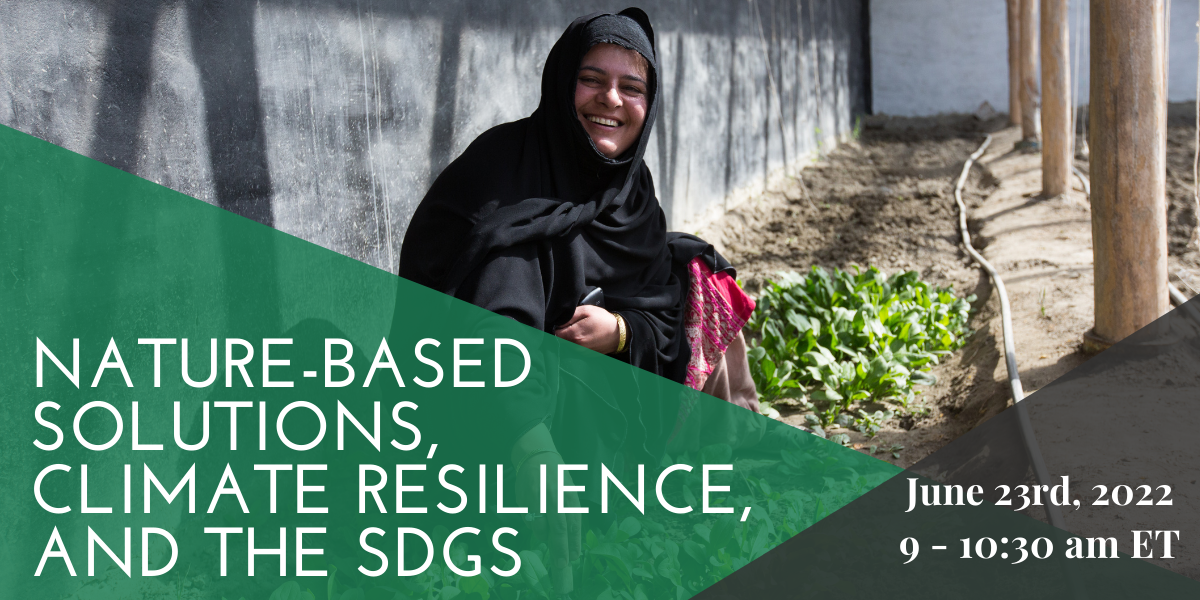The world is rushing towards the dangerous threshold of 1.5 degrees of global warming due to a lack of urgent action on climate change, while at the same time facing related crises such as biodiversity loss and severe food insecurity.
Nature-based solutions offer an effective approach to mitigating and adapting to climate change. By protecting, restoring, and sustainably managing ecosystems, nature-based solutions hold the potential to reduce climate-related risks and address the biodiversity crisis, while delivering social and economic benefits to those living within these ecosystems.
To explore the potential of nature-based solutions as well as the enabling policies they require, AKFC welcomed a hybrid (virtual and in-person) audience to the Delegation of the Ismaili Imamat in Ottawa on June 23, 2022, to join a discussion on Nature-based Solutions, Climate Resilience, and the SDGs. Moderated by Patricia Fuller, Senior Fellow at the Graduate School of Public and International Affairs at the University of Ottawa and former Climate Ambassador for the Government of Canada, the discussion included the following panelists:
- Didier Van Bignoot, Global Advisor, Agriculture, Food Security, and Climate Resilience at the Aga Khan Foundation
- Benjamin Simmons, Director, Sustainable Infrastructure, and Director, Nature-Based Infrastructure Global Resource Centre at the International Institute for Sustainable Development (IISD)
- Jimena Eyzaguirre, Senior Climate Change Adaptation Specialist, ESSA Technologies
Growing Interest Despite Limited Financing
Fuller opened the discussion by noting that in recent years, nature-based solutions have gained increasing attention from governments and non-state actors as an important approach to mitigation and adaptation to climate-related risks such as drought, heatwaves, and flooding, as well as related biodiversity loss and ecosystem degradation. Nature-based solutions have an incredible potential to help communities strengthen climate resilience and deliver upwards of 30% of climate mitigation needs, yet the approach remains underfunded and underutilized as a climate strategy globally.
Simmons noted that despite growing interest in nature-based solutions, there is relatively little financing earmarked for nature-based initiatives. In 2017-2018, only about 8% of public funding for climate action supported nature-based solutions, and less than 3.5% of public funding supported adaptation-focused nature-based solutions. Simmons remains hopeful that the flow of capital into nature-based solutions will increase in coming years as governments recognize the important opportunities and benefits for nature and human well-being – with the Government of Canada’s funding commitments being an example of this shift. Yet implementing and scaling up nature-based solutions also requires capacity building to raise awareness and the ability to implement quality projects that effectively deliver on social, biodiversity, and climate goals.
Valuing Co-benefits, Reducing Climate Risks, and Building Resilience

Despite global funding challenges, projects advancing nature-based solutions offer insights into successful implementation. Aga Khan Foundation’s Van Bignoot highlighted several ongoing initiatives including a sustainable rice cultivation system in Madagascar aimed at improving soil quality and reducing labour demands; biodiverse micro-forests that provide food, medicine, and animal feed; and coastal restoration initiatives that support mangrove restoration while also supporting alternative income-generating activities in local communities, notably those that create economic opportunities for women and help address gender inequalities. Reflecting on the rising food insecurity in Africa, Van Bignoot emphasized that “it’s not normal that countries with an enormous amount of agricultural land are reliant on outside wheat, for example. There are so many simple, creative, nature-based solutions that could change the situation dramatically.” He highlighted that these solutions can be sustainable in the long-term as well.
Simmons likewise pointed to the benefits of advancing cost-effective and climate-resilient nature-based infrastructure (NBI) initiatives in place of traditional grey infrastructure projects. He noted the importance of incorporating the value of climate, ecological, or social co-benefits, as well as the cost of negative externalities such as climate risks into the economic model so that project proponents and financial institutions take these elements into consideration when deciding between gray and nature-based infrastructure. “This is absolutely critical for supporting NBI because when we do this, we not only have cost savings [of nature-based infrastructure], we also have multiple benefits beyond what grey infrastructure is able to provide. Because NBI uses an ecosystem-based approach, we have a multitude of ecosystem benefits whether it’s climate change, adaptation or mitigation, and ecosystem resilience.” In addition, he emphasized the need for robust stakeholder engagement processes to drive project proponents to fully think through the implications of projects.
No Solutions Without Collaboration
Indeed, while nature-based initiatives have the potential to drive equitable outcomes that support marginalized and diverse communities, all the speakers emphasized that community engagement is critical to advancing well-being. Projects that fail to effectively consult and gain the consent of Indigenous peoples or local communities, reduce local access to land serving as the basis of livelihoods, or overlook gender inequalities can amplify the vulnerabilities of affected communities rather than improve resilience to climate-related risks and other systemic challenges.
Eyzaguirre emphasized that engaging communities in all phases of the project improves the outcomes of nature-based initiatives. She noted, “local knowledge is extremely valuable for understanding conditions on the ground, especially in data-limited conditions. There’s an incredible development in global datasets that can be harnessed, but at the local level, their accuracy is not great. Bringing in local knowledge to understand where the assets are, what their condition is, and what risks they are facing is important… and including experiential knowledge and views from diverse and marginalized populations is incredibly important.” Eyzaguirre outlined several high- and low-tech tools such as participatory mapping that contribute to a better understanding of the quality of natural assets, possible risks, and the ecosystem services flowing from these assets that connect to outcomes that people care about such as food or water security, health, education, and livelihoods.
Additional NBS Resources
Initiative-specific toolkits such as AKF’s guide to planting micro-forests, capacity-building initiatives such as the Nature for Climate Adaptation Initiative (NCAI), and frameworks such as the IUCN’s Global Standard for Nature Based Solutions, as well as AKFC’s Key Resources on Nature-Based Solutions can help guide project proponents in ensuring projects deliver ecological and equitable social benefits.
Watch the full recording:
Nature-based Solutions, Climate Resilience, and the SDGs was the second event in a speaker series on climate change resilience and adaptation.
The series aims to bring together practitioners, advocates, and others who share an interest in exploring and discussing how we may use the climate crisis as a catalyst for great leaps in addressing the complex challenges involved in confronting climate change in a manner that advances sustainable development, well-being, and resilient livelihoods for all.
Sign up for AKFC’s monthly newsletter and check our events page regularly for information on upcoming events in our climate series and other programs.


